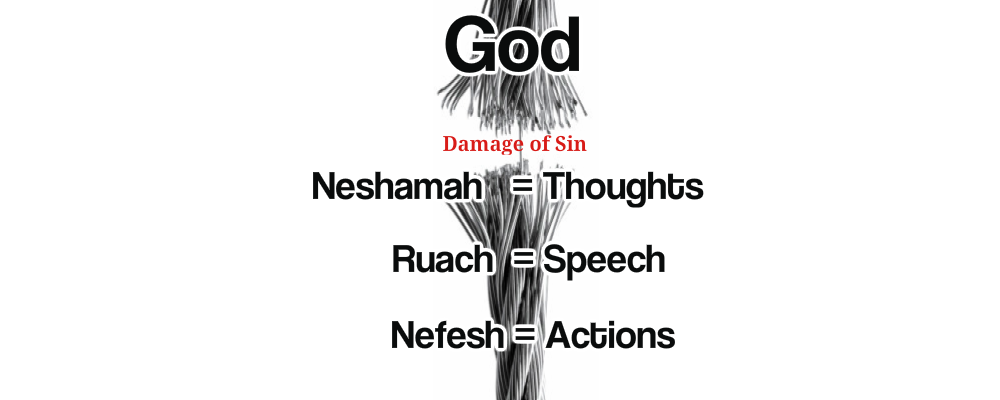Knowledge of the soul helps us understand the repentance process described in the Bible. Many people do not understand how damaging sin is, and what kind of impact it has on the soul. Sin disconnects us from God, but we can re-connect to God through obedience by faith. When we ask for His help, through the merit of Jesus and through our obedience, He allows us to work the process of reconnecting to Him through repentance. When you truly live repentance out, your confession does heal your soul.
In Luke 16:19-31 Jesus tells a parable about the Rich Man and Lazarus. Jesus explains that the rich man was in Hades where he was in torment, and Lazarus was at the side of Abraham. This parable is a very good example of how sin in this world will impact our soul in the next. How we live here determines our spiritual destiny.
In an audio teaching series Pastor Lancaster recorded called, “What About Heaven and Hell”, he brought out a few extraordinary thoughts that are worth mentioning here. First, this parable shows when we die and go into the World of Truth, just as the Rich Man knew Lazarus, we will know and recognize people that were in our life. As the Rich Man was asking Abraham to send Lazarus back to reveal the truth to his family members, this reveals that those who are in Hades are praying for their relatives. Something else about the parable was that Jesus was answering the question, “Does someone who is crippled automatically go to Heaven?” and apparently the answer was yes because Jesus said
“… while Lazarus received bad things, but now he is comforted here…” (Luke 16:25).
The last thing that was very important about this parable is when Jesus said
“… If they do not listen to Moses and the Prophets, they will not be convinced even if someone rises from the dead.” (Luke 16:31).
The Bible gives few clues about our soul, but there are two main points about this parable Jesus is explaining in reference to our soul. First, we do have a soul and we are going to be rewarded and punished based on our life experiences here. Second, if we do not listen to Moses and the Prophets, most likely we are not going to truly believe in someone and listen to a person who was even raised from the dead.
Your Nefesh Is Your Identity
Today there are many people resuscitated from CPR or from other medical procedures, and many people have come back to tell their experience. It happens so much today that many people roll their eyes when they hear about another person sharing their near-death experience. There are a few common experiences over the years that seem to be similar, and that is when you die, you can see yourself from outside of your body. The Rabbis refer to this (“you are seeing yourself”) as your Nefesh, and this is who you are when you leave here. Pastor Lancaster explained this best in his series on The World of Souls when he said, “imagine you have silly puddy and you put it on a newspaper image. When you lift it up you will see the image on the silly puddy. That is what your Nefesh will do – it takes an imprint of your life and sears it to your Nefesh and that becomes a part of your eternal identity.”
If you have a hard time believing anything about the subject of the soul and the identity that is within it, please try to at least understand the concept. Since you are reading this it is most likely you do believe in the resurrection, therefore, talking about the soul should not be much different. Knowledge of the soul will also help you have a much better understanding of the repentance process described throughout the Bible. There are many sources online, and Pastor Lancaster’s teachings are by far the best from a Christian perspective.
Three Strands are not Quickly Broken
The Rabbis speak of five layers of your soul, but there are only three layers that need to be discussed here to understand how confession has a part of cleansing the soul, they are called the Nefesh, Ruach, and Neshamah. According to many Jewish sources, the Nefesh is the soul as the engine of physical life. The Ruach is the emotional self and “personality.” The Neshamah is the intellectual self. Another way some Rabbis explain this is that the Nefesh represents your actions, the Ruach represents your speech, and the Neshamah represents your thoughts. All three of these work together to stay connected to God in order for us to be led by the Spirit of God.
As Paul says in Romans 8:14, “For all who are led by the Spirit of God are sons of God.”

We disconnect from God when we live a sinful life, and we re-connect to God through repentance and our obedient actions done in faith.
James says in James 2:24, “You see that a person is justified by works and not by faith alone.”
According to the Rabbis each level of your soul can be disconnected from the level that is above it. For example, when you do a sin that is related to actions, the Nefesh (action) starts to disconnect from the level of Ruach (speech). In the same way each level can be reconnected through repentance. The Ruach (speech) is the middle level between Nefesh (action) and Neshamah (thoughts). As your soul becomes disconnected it is said you experience depression, aggravation, and confusion. This helps understand why someone living in sin cannot comprehend the things of God or why someone would not know how to choose life over death. God leaves us a single thread that allows us to recognize we need help. When we ask for His help, through the merit of Jesus and through our obedience to confess that we are not obeying God, He allows us to start the process of reconnecting to Him through repentance. Each part of the soul is a separate piece connecting to each other. As stated in Ecclesiastes 4:12
“Though one may be overpowered, two can defend themselves. A cord of three strands is not quickly broken.”
- When we confess our sin (Speech) our Ruach connects back to the Nefesh and Neshamah.
- When we stop the sin (Actions), our Nefesh heals.
- When we start to understand and feel regret (Thoughts) our Neshamah starts to heal.
Healing of Your Soul Allows You to be Fully Connected to God
All three of these need to be healed and restored to be fully connected to God in order to be led by the Spirit of God. The stronger our Nefesh is, the easier it is to live for God and keep His commandments. The stronger our Ruach is the less we have evil speech. The stronger our Neshamah is the more pure our thoughts are. This is why a life of repentance is so vital to always stay connected with God. Having a disconnected soul is like having static on your radio. A radio frequency has to be clear in order to have good reception to hear what is being broadcast. In the same way, sin causes interference with our soul in relationship to God.
In the parable of the Rich Man and Lazarus, Jesus explains we have to listen to Moses and the Prophets to be in a place to understand what repentance is (Luke 16:29-31). When we understand God’s instructions (Torah), we can believe and apply the correct actions with our faith, and take complete advantage in the knowledge of the resurrection of Jesus and rely on His merit in order to live a life of repentance.
As you go through this 30-day journey and work through the repentance process, know that there is a healing of your soul taking place deep inside of you that is far greater than you can comprehend. When you truly live repentance out, your confession will heal your soul.
Back to Day 21 | Continue to Day 23

